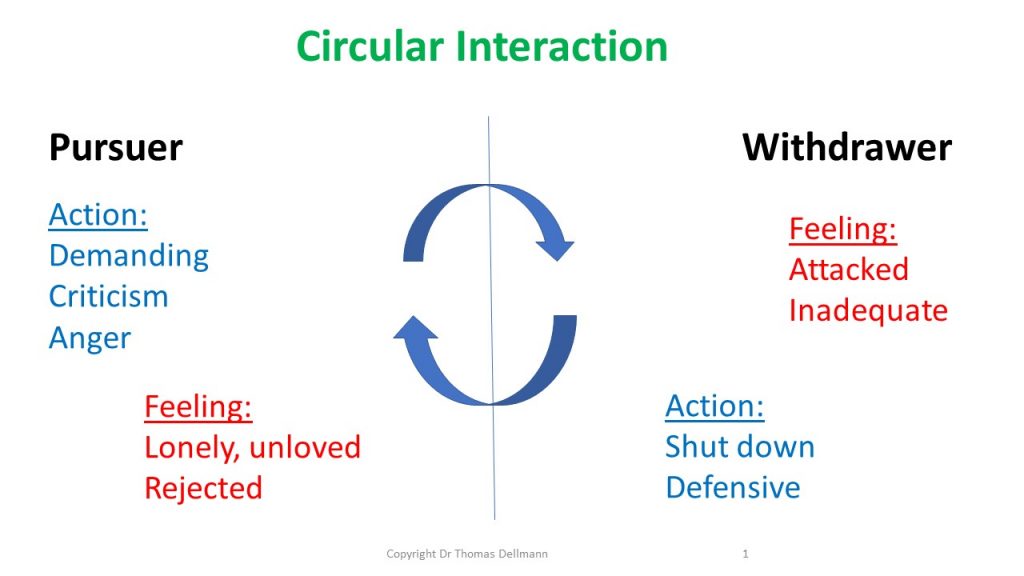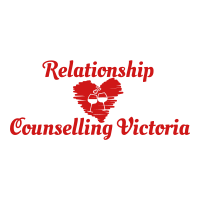Secure bonds
EFT relationship counselling is based upon helping couples (re)create a secure bond. What does that mean?
When we feel loved we feel that we belong to the other person and feel valued by them. We are secure in the knowledge that our lover will be there for us when we need them. This security creates an emotional and physical bond, also called “attachment,” to another one. As a result, this bond gives a sense of stability and security necessary to take risks, branch out, and grow and develop as a person.
By contrast, in cases where the partners have a weak attachment, there are feelings of inadequacy and a lack of intimacy between the partners. On the other hand, when attachments are too strong, there can be issues with co-dependency. Therefore, relationships work best when both parties manage to balance intimacy with independence.
Reactions when secure attachment is threatened
The pursuit – withdrawal dance
In distressed couples there is often a gap between the partners about how close they want to be with other. The partner who longs for more closeness and connection often feels lonely and rejected. They tend to respond to relationship stress by moving toward the other. They seek communication, discussion, togetherness, and expression of feelings. They are urgent in their efforts to fix what they see as wrong. They are anxious about the distance their partner has created and take this to heart. Consequently, they criticize their partner for being emotionally unavailable. They may be labelled by the distancing partner as needy, demanding, and nagging.
By contrast, a partner who is less close tends to respond to relationship stress by moving away from the other. They want physical and emotional distance and may have difficulty with vulnerability. As a result, they retreat into other activities to distract themselves. They often pride themselves as being self-reliant and value privacy. They are most approachable when they don’t feel pressured, pushed, or pursued. They are labelled by the pursuing partner as unavailable, withholding, and shut down.
This then leads to a cycle where each partner feels their own emotional hurt strongly and where they take action to cope with their hurt. However, they under-estimate how hurtful this action is to their partner, who also takes self-protective action. This leads to more hurt to the first one; and so the cycle continues…

Marriages can fall apart when partners become entrenched in these roles. If something does not change, both begin to feel criticized and develop contempt for each other – two signs that their relationship is in crisis.
An example
A common situation is a wife who feel ignored and rejected about the lack of communication from her rather unemotional husband. She wants him to open up to her more. She wants him to be more vulnerable and to connect with her so they can work on getting along better. His response is, “I don’t know what you’re talking about, we do things together.”
The more demands she makes, the further he moves away. As her frustration grows she begins to criticize him – and he fights back with defensiveness. She becomes angry and expresses contempt. He stonewalls.
She doesn’t understand why he won’t see how wrong and stubborn he is. He can’t believe she doesn’t know how unfair her demands are and how inadequate they make him feel. He constantly feels that he is not good enough for her.
Both men and women can be pretty good pursuers or withdrawers. However, women tend to be more commonly pursuers and men more commonly withdrawers.
How can a relationship counsellor help?
Initially, I ask each partner questions about their experience of the relationship, listen to their answers with my heart and my head. As part of this process validate both the feelings of each partner, as well the need for self-protection. At the same time, I put the two stories from each partner together and merge them into one story, usually one of a cycle that both partners participate in.
In EFT relationship counselling I listen empathetically and non-judgmentally to both parties trying to understand where each one is coming from. I ask myself, what is your pain that brings you to relationship counselling? What are your unfulfilled needs? What do you do to cope with your pain arising from unfulfilled needs?
Writing out such a cycle on a white board can help each partner to see their contribution. Subsequently, I help them to acknowledge the unintended effects of their behaviour on the other one and take responsibility for the pain they may have caused. In the following sessions I help the withdrawer to engage more with the pursuer and the pursuer to soften their complaints.
Over the course of several relationship counselling sessions this step by step process leads to a reduction in conflict. On the other hand, it increases empathy for each other, as well as mutual understanding and respect. Finally, it enhances trust, emotional safety and creates a secure bond between both partners.

Relationship Problems Thomas specializes in
- Overcoming conflict
- Improving communication
- Recovery from an affair
- Understanding and dealing with gender differences
- Sexual difficulties
- Dealing with violence and / or abuse
- Rebuilding after divorce / separation
- Integrating blended family members
- Managing the impact of past sexual abuse and other traumas
Support for Diversity
- Same sex relationships
- Poly-amorous and open relationships
Ready to book?

